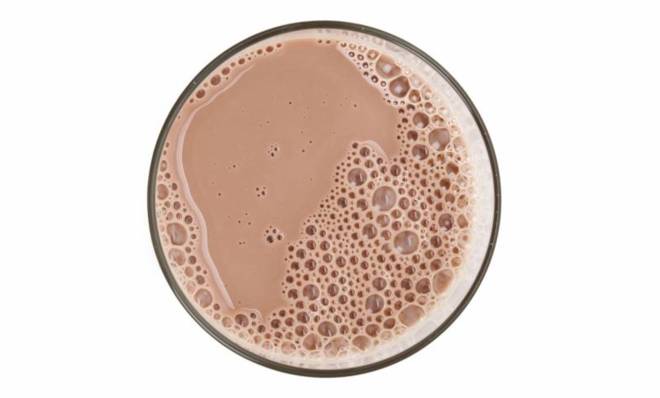How does chocolate milk stack up as a sports drink?
Big Dairy wants you to ditch your Gatorade

A free daily email with the biggest news stories of the day – and the best features from TheWeek.com
You are now subscribed
Your newsletter sign-up was successful
Not only is chocolate milk a delicious treat, but it's also the perfect sports drink.
That, at any rate, is what Big Dairy would like you to believe, as it ramps up an effort to capture fitness fanatics.
The National Dairy Council's new "Got Chocolate Milk?" campaign features sweaty athletes chugging bottles of chocolate milk following a workout. And dairy trade groups around the world are starting to refer to it as "nature's sports drink."
The Week
Escape your echo chamber. Get the facts behind the news, plus analysis from multiple perspectives.

Sign up for The Week's Free Newsletters
From our morning news briefing to a weekly Good News Newsletter, get the best of The Week delivered directly to your inbox.
From our morning news briefing to a weekly Good News Newsletter, get the best of The Week delivered directly to your inbox.
Their argument: After tough exercise, an athlete needs to hydrate, restore their levels of glycogen (or sugar), and consume enough protein to help rebuild and repair their tired muscles.
One percent chocolate milk is composed of fluid, simple sugar (about 26 grams per serving) and protein (about 8 grams), making it the "perfect" drink to replenish tired athletes. It also has vitamin D, calcium, and B12, which is more than Gatorade can say.
But is there any evidence to back up chocolate milk's claims?
Yes, actually. In a 2006 study at the University of Indiana, researchers asked nine male cyclists to perform two workouts, the second one "to exhaustion," on three separate days. Following the first push, subjects drank either chocolate milk, a fluid replacement drink, or a carbohydrate replacement drink. The results: Subjects drinking chocolate milk and the fluid replacement drink well outperformed those drinking the carbohydrate drink.
A free daily email with the biggest news stories of the day – and the best features from TheWeek.com
A similar, more recent study of cyclists from the University of Texas, Austin compared how they responded to chocolate milk versus drinks that contained only carbohydrates. It found that those who drank chocolate milk had "more muscle and less fat, improved times while working out, and [were in] overall better physical shape than peers who consumed sports beverages that just contained carbohydrates," said Dr. John Ivy, who lead the study.
Other studies produced less emphatic results. One from the American College of Sports Medicine observed 13 male college soccer players, who trained for one week, then for the next four days followed their workouts with either low fat chocolate milk or a carb-only beverage. They then took a two-week break and repeated the cycle. All athletes improved training times regardless of which drink they were using, and there were no differences in performance tests, subjective muscle soreness, or muscle and physical fatigue.
Over time, however, the chocolate milk drinkers had "significantly lower levels of creatine kinase — an indicator of muscle damage — compared to when they drank the carbohydrate beverage," said the study.
So there is some evidence to back the milk industry's claims. But is it all the industry is cracking it up to be?
Jackie Maurer Abbot, a registered dietitian and board-certified specialist in sports dietetics, told Active that athletes "need to appropriately time consumption of adequate amounts of fluids and electrolytes, carbohydrates for replenishing glycogen storage, and high-quality protein for repairing and rebuilding muscle."
She said chocolate milk actually doesn't provide enough carbs and protein for many athletes, especially those working out for two or more hours.
Those doing recreational or moderate endurance and strength training only need 0.36 to 0.54 grams per pound of body weight. Clark also said that a college athlete training for two to three hours would need approximately 3 to 5 grams of carbohydrates per pound of body weight to completely restore glycogen. While chocolate milk can contribute, it contains only 8 grams of protein and 36 grams of carbohydrates per 8 ounces. [Active]
While chocolate milk may help with muscle recovery more than carb-based drinks, serious athletes would be better off with a full, healthy, balanced meal, particularly one with whole grain carbs instead of simple, chocolate-y carbs, she added.
It's also worth noting that chocolate milk needs to be refrigerated — which makes it a kind of gross choice for anyone working out for a long time outdoors in the heat.
Carmel Lobello is the business editor at TheWeek.com. Previously, she was an editor at DeathandTaxesMag.com.
-
 The EU’s war on fast fashion
The EU’s war on fast fashionIn the Spotlight Bloc launches investigation into Shein over sale of weapons and ‘childlike’ sex dolls, alongside efforts to tax e-commerce giants and combat textile waste
-
 How to Get to Heaven from Belfast: a ‘highly entertaining ride’
How to Get to Heaven from Belfast: a ‘highly entertaining ride’The Week Recommends Mystery-comedy from the creator of Derry Girls should be ‘your new binge-watch’
-
 The 8 best TV shows of the 1960s
The 8 best TV shows of the 1960sThe standout shows of this decade take viewers from outer space to the Wild West